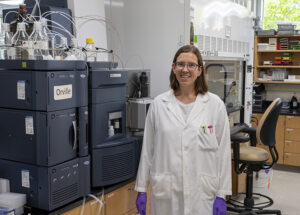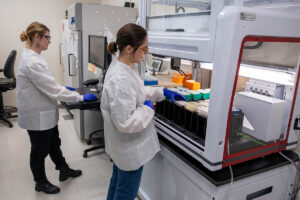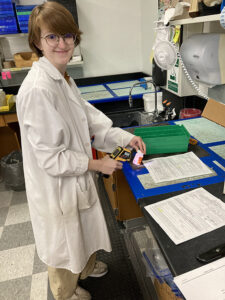The Wisconsin State Laboratory of Hygiene was featured in three recent stories published by the UW School of Medicine and Public Health (UWSMPH).
Pathbreaking cystic fibrosis research initiated in Wisconsin 40 years ago changed the course of diagnosis and treatment of children around the world
The WSLH Newborn Screening Program played a critical role in this groundbreaking research.
“The Wisconsin cystic fibrosis RCT project certainly laid the foundation for CF newborn screening in Wisconsin, in the nation, and beyond. CF newborn screening in Wisconsin continues to evolve,” she (WSLH Newborn Screening Director Dr. Mei Baker) explained. “With the adoption of next-generation sequencing technology, the newborn screening laboratory at the Wisconsin State Laboratory of Hygiene now can simultaneously detect 689 CF-causing variants. It is the most comprehensive panel at this time, and a relevant practice to the current discussion on genomic sequencing in newborn screening.”
UWSMPH story – https://www.pediatrics.wisc.edu/pathbreaking-cystic-fibrosis-research-initiated-in-wisconsin-40-years-ago-changed-the-course-of-diagnosis-and-treatment-of-children-around-the-world/
Wisconsin Partnership Program Turns 20 – Support for Medical and Public Health Education, Community Service and Research Helps Transform School
The latest issue of UWSMPH’s Quarterly magazine has a story on the 20th anniversary of the Wisconsin Partnership Program (WPP), which was started with a donation of half of the proceeds from the conversion of Blue Cross & Blue Shield United of Wisconsin from a non-profit to a for-profit corporation. The other half of the proceeds was donated to the Medical College of Wisconsin. The WPP has helped transform the UW Medical School into the UW School of Medicine and Public Health – the country’s first combined school of medicine and public health.
The WSLH gets a mention in the article as being key to this transformation.
“The initial Blue Cross/Blue Shield gift totaled more than $300 million to each school and had terms that are still followed today, including that 35 percent of its grants go to community health projects and 65 percent to research and education; requirements for oversight and accountability; and the call for then-dean Philip M. Farrell, MD, PhD (PG ’72), and Medical College of Wisconsin president Mike Bolger to jointly lead listening sessions to learn about health needs.
“We traveled the entire state, meeting with communities all the way up to Ashland on Lake Superior,” Farrell recalled. “We talked about the community-academic partnership theme. This was a natural for SMPH — our school was pursuing the Wisconsin Idea.”
A pediatrician and cystic fibrosis expert and now an emeritus dean, Farrell said it was his dream to create the country’s first combined school of medicine and public health.
“I realized that with our excellent Department of Population Health Sciences, world-class epidemiologists, and the Wisconsin State Laboratory of Hygiene on our campus, we had a strong core to become a school of medicine and public health,” he said. “Would we have been able to do it without the Blue Cross/Blue Shield money? Absolutely not.”
‘Forever chemicals’ show up in Wisconsin residents – Highest levels found in those who eat locally-caught fish
The WSLH Chemical Emergency Response (CER) section performed PFAS testing on serum samples from 605 adults as part of a collaborative UWSMPH, WSLH and WI Department of Health Services research study. The finding were published in Environmental Research – link below.
UWSMPH news release – https://www.med.wisc.edu/news/pfas-found-in-wisconsin-residents/
Determinants of per- and polyfluoroalkyl substances (PFAS) exposure among Wisconsin residents – Environmental Research, Volume 254, 1 August 2024, 119131, https://doi.org/10.1016/j.envres.2024.119131


